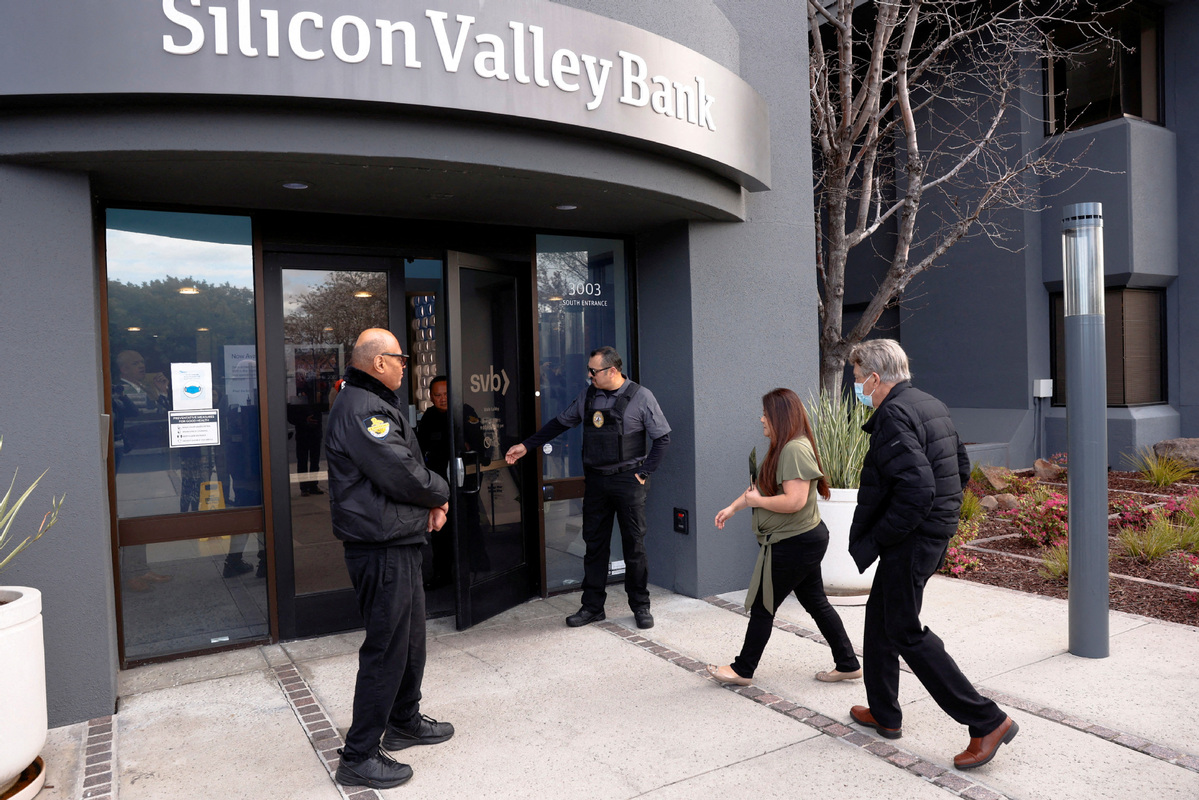Focus shifts to Fed, inflation after bank failures
By HENG WEILI in New York | China Daily Global | Updated: 2023-03-14 10:23

The Federal Reserve's meeting next week will be closely watched in light of recent bank failures in the US, as the central bank still is trying to get a handle on persistent inflation.
A day after a handful of US agencies announced that all depositors at two failed banks would be made whole, investors took it out on the stock prices of regional banks Monday, led by sharp losses in First Republic Bank.
News of fresh financing Sunday failed to assuage fears of possible bank contagion following the collapse of SVB Financial Group, parent of Silicon Valley Bank, and Signature Bank in New York.
While markets have started to price in a strong likelihood that the Fed will ease up on its interest rate increases to take pressure off the banking sector, evidence that inflation remains hot could once again lift uncertainty over the central bank's next move.
The Fed is "between a rock and a hard place", said Hans Olsen, chief investment officer at Fiduciary Trust Co. "The rock is they have to deal with inflation, and the hard place is they have this banking panic, like a fever that is running through the markets right now."
Also adding to the Fed's dilemma is the Consumer Price Index (CPI) report for February, which will be released on Tuesday. Expectations are that prices will be up 6 percent over February 2022.
"I honestly think that (Tuesday's CPI data) is more important than even the FOMC (Federal Open Market Committee) meeting," Mike Fratantoni, the Mortgage Bankers' Association's chief economist, told Barron's.
But Professor Raymond Hill, senior lecturer of finance at the Goizueta Business School of Emory University in Atlanta, told China Daily: "This seems to be a liquidity crisis for the banks involved, not a crisis of solvency (as in 2008), so I don't believe there will be a banking crisis to deter the Fed from focusing on inflation at its next meeting (March 21-22).
"SVB's financial situation deteriorated because they had to pay higher interest rates on deposits but were locked into low rates on longer-term investments," Hill said.
"Signature and SVB apparently had a large proportion of their deposits in excess of $250,000, so those large depositors headed for the exits at the first hint of trouble. This precipitated a liquidity crisis.
"Since the government has said that there will be no cost to taxpayers, this tells me that the banks are probably solvent; a slow liquidation of the assets will eventually be enough to cover all deposits," Hill said.
US President Joe Biden vowed on Monday to do whatever was needed to address a potential banking crisis.
"Americans can have confidence that the banking system is safe," he said. "Your deposits will be there when you need them."
News of the banking industry's woes prompted some sharp commentary on social media.
"If you thought SVB was bad ... The Fed is sitting on unrealized losses of ~$1.2 trillion on their $8.3 trillion bond portfolio, tweeted "Wall Street Silver" on Tuesday to 716,000 followers.
Journalist Glenn Greenwald tweeted to his 2 million followers, "Is the USG's guarantee of Silicon Valley Bank deposits similar to the 2008 wealthy-protecting bailouts, or a wise measure to save regional banks?"
Entrepreneur Patrick Bet-David wrote to his 410,000 followers on Twitter: "FDIC only has $125b securing $9.9 trillion. That's only 1.26%! FDIC may be able to protect the depositors at SVB, but it won't be able to do if it happens to a few other banks."
Genevieve Roch-Decter, CFA, wrote on Twitter to her 355,000 followers: "The Fed and FDIC have signaled that they'll backstop basically every bank's deposits. Does this incentivize banks to take even greater risks with our deposits?"
Art Hogan, chief market strategist at B. Riley Wealth, said the market is "finding out in real time what the risk of rising interest rates at such a fast pace can do to the balance sheets of some of the regional banks".
Founded in 1985, First Republic had $212 billion in assets and $176.4 billion in deposits as of the end of last year, according to its annual report. The San Francisco-based bank's shares were down nearly 62 percent — more than $50 — on Monday to $31.21 but rebounded by almost $5 in afterhours trading.
About 70 percent of First Republic's deposits are uninsured, above the median of 55 percent for medium-sized banks and the third highest in the group after Silicon Valley Bank and Signature Bank, according to a Bank of America note.
Hogan said each regional bank has its own exposure to different parts of the market. He said that the fate of regional bank stocks will be "case by case" as investors look to see which ones could have the most negative exposure.
Brian Levitt, global strategist at Invesco, said the market is focusing on smaller banks with specialty lending businesses. After Silicon Valley Bank, investors turn their attention to the next bank exposed to interest rate and specific credit risks.
"First Republic Bank, which has significant exposure to the coastal real estate markets appears to be next on the list," he said.
Reuters contributed to this story.
























